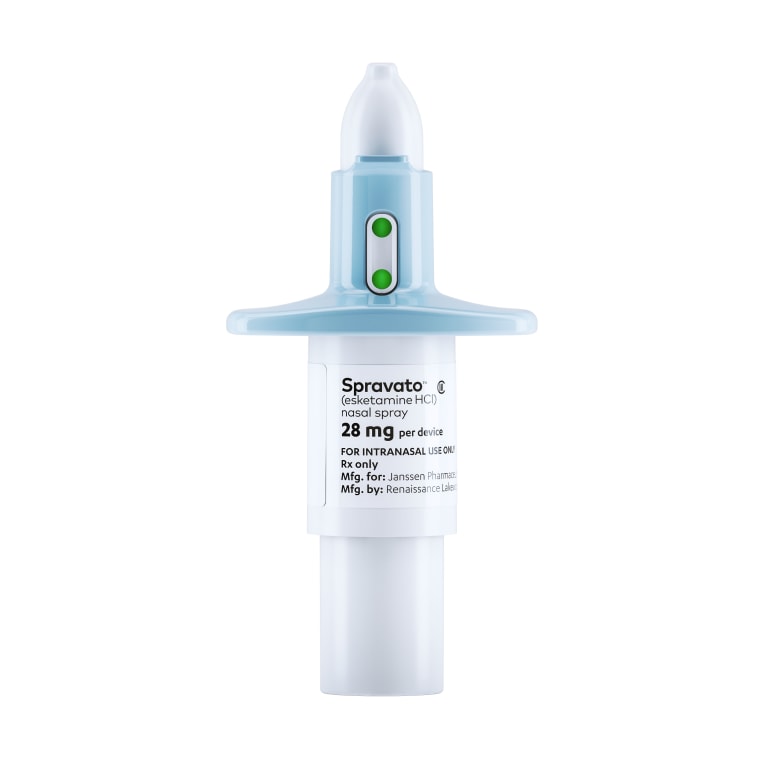The U.S. Food and Drug Administration on Tuesday approved esketamine, an experimental nasal spray that delivers the active ingredients of the “club drug” ketamine, as a new treatment for severe depression.
The Johnson & Johnson nasal spray is a variation of the anesthetic ketamine — a pain reliever that was widely abused as a street drug, Special K, in the 1980s and 1990s. The newly approved drug by the FDA is the first major depression treatment to reach the U.S. market in decades. It is especially effective in patients who have not benefited from at least two different therapies, also known as treatment-resistant depression, the FDA said.
“There has been a long-standing need for additional effective treatments for treatment-resistant depression, a serious and life-threatening condition,” Dr. Tiffany Farchione, acting director of the Division of Psychiatry Products in the FDA's Center for Drug Evaluation and Research, said in a statement Tuesday.
Intravenous infusions of ketamine have been shown to help people with severe depression who experience suicidal thoughts, but the laborious process to administer the medication could be frustrating to patients. Experts believe that the FDA approval of a quick-acting, easy-to-use spray treatmentis a pivotal moment in the history of mental health therapy.
“This offers an extremely important, new treatment for people suffering with treatment-resistant depression,” Dr. Gerard Sanacora, professor of psychiatry at Yale University and director of the Yale Depression Research Program, told NBC News. “We know that if you don’t respond to the first two standard classes of antidepressants, the chances of you responding to a third or fourth reduces significantly, so this drug which has a completely different mechanism of action is particularly effective for those who have no standard treatment.”

Drugmakers believe the spray can help 30 to 40 percent of patients who don't respond to antidepressants.
The spray works more quickly than other known treatments, such as antidepressants which can take two weeks or more to take effect, showing benefits after only four hours.
“This is extremely important for people who need a drug with a quicker clinical benefit. Esketamine may shorten hospital stay or be used in people who have imminent thoughts or risks of hurting themselves,” Sanacora said.
Depression is very common. Around the world, 300 million people are affected and almost 800,000 commit suicide, according to the World Health Organization. In the United States, from 2013 to 2016, eight percent of American adults had depression in a given 2-week period, and about 80 percent of adults reported at least some difficulty with work, home or social activities because of their depression symptoms, according to the Centers for Disease Control and Prevention.
While not every person with depression thinks about suicide, the lifetime risk of attempting suicide for someone with depression is approximately 20 times that of the general population, even among those who receive adequate treatment.
Warning signs aren't always obvious, and they may vary from person to person. Some people make their intentions clear, while others keep suicidal thoughts and feelings secret, underscoring the importance of quick and effective treatment.
“Depression is thought to be the leading cause of disability around the world. At the individual level, there is a close relationship between depression and suicide. In the U.S., there are over 40,000 people a year who die of suicide, and up to 17 percent of people are affected with depression at any given time. So, it’s not only very common but it can have very serious consequences, which is a dangerous combination,” Sanacora said.
The discovery of ketamine’s effects on depression was unexpected and researchers are still unsure how the drug works differently on those with severe depression versus those with milder forms.
In February, a federal advisory panel said the benefits of the nasal spray outweighed the risks. The panel noted that side effects, which include dizziness, nausea, increased blood pressure and an unpleasant feeling of dissociation, should be discussed with patients.
Sanacora, who was the lead author of a consensus statement that supported ketamine's use in the treatment of mood disorders, says the drug is safe for use, but noted its potential for abuse, cautioning that the drug is still not recommended for at-home use.
“We're a long way from this being an at-home or over-the-counter drug. Drug diversion is a real concern for this class of drug, so the plan is to give the drug to providers who would then administer the drug to patients on-site,” Sanacora said.
Although today is an exciting next step for the field of novel drug development, he said, experts believe more research on its long-term use and putting measures in place to limit access to teens will play a big role in the drug's success.
“Studies looking at the long-term effects of esketamine have been conducted for up to a year, and there is an extension study that is currently ongoing. For esketamine, there was no evidence of cognitive deficits or trouble with the urinary bladder, as was seen in animal studies and those who frequently misused ketamine,” Sanacora said.
“Most antidepressant drugs are studied up to 8 weeks, so to have this one-year data is pretty unique,” he added.
Previously, the use of ketamine infusions to treat depression was not covered by insurance, and sessions ranged from $350 to $700. The wholesale price of the Johnson & Johnson nasal spray depression treatment, Spravato, will be priced at $590 for a 56 mg dose and $885 for 84 mg, the FDA said in a statement. Insurance coverage is anticipated.
Currently, Eli Lilly's Symbyax is the only FDA-approved drug for treatment-resistant depression.
“Esketamine isn’t to be used in place of Prozac. This is meant to be used alongside standard treatments and not instead of standard treatments. We want people to use the medicine responsibly and rationally,” Sanacora said.


